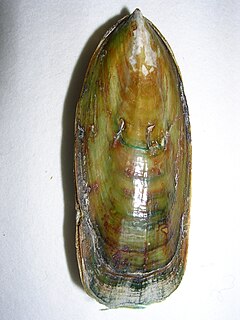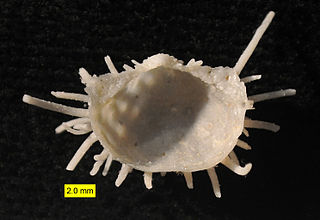| Lingulida | |
|---|---|
 | |
| Lingulella caelata [1] | |
| Scientific classification | |
| Kingdom: | Animalia |
| Phylum: | Brachiopoda |
| Class: | Lingulata |
| Order: | Lingulida Waagen, 1885 |
| Subfamilies | |
Lingulida is an order of brachiopods. [2]
| Lingulida | |
|---|---|
 | |
| Lingulella caelata [1] | |
| Scientific classification | |
| Kingdom: | Animalia |
| Phylum: | Brachiopoda |
| Class: | Lingulata |
| Order: | Lingulida Waagen, 1885 |
| Subfamilies | |
Lingulida is an order of brachiopods. [2]
The following are extinct species and genera belonging to the family Lingulidae. [3]
This is a list of players, both past and current, who appeared at least in one game for the Detroit Tigers, with their main position and years played.

Lingula is a genus of brachiopods within the class Lingulata. Lingula or forms very close in appearance have existed possibly since the Cambrian. Like its relatives, it has two unadorned organo-phosphatic valves and a long fleshy stalk. Lingula lives in burrows in barren sandy coastal seafloor and feeds by filtering detritus from the water. It can be detected by a short row of three openings through which it takes in water (sides) and expels it again (middle).
Kingena is an extinct genus of primarily Cretaceous-aged brachiopods of the family Kingenidae whose fossils are found in marine strata of Antarctica, Europe, and New Zealand. Early Paleocene-aged fossils from Denmark represent the youngest species.

Brachiopods, phylum Brachiopoda, are a phylum of trochozoan animals that have hard "valves" (shells) on the upper and lower surfaces, unlike the left and right arrangement in bivalve molluscs. Brachiopod valves are hinged at the rear end, while the front can be opened for feeding or closed for protection. Two major groups are recognized, articulate and inarticulate. The word "articulate" is used to describe the tooth-and-groove features of the valve-hinge which is present in the articulate group, and absent from the inarticulate group. This is the leading diagnostic feature (fossilizable), by which the two main groups can be readily distinguished. Articulate brachiopods have toothed hinges and simple opening and closing muscles, while inarticulate brachiopods have untoothed hinges and a more complex system of muscles used to keep the two valves aligned. In a typical brachiopod a stalk-like pedicle projects from an opening in one of the valves near the hinges, known as the pedicle valve, keeping the animal anchored to the seabed but clear of silt that would obstruct the opening.

Paterinata is an extinct class of linguliform brachiopods which lived from the Lower Cambrian (Tommotian) to Upper Ordovician (Ashgill). It contains the single order Paterinida and the subfamily Paterinoidea.

Productida is an extinct order of brachiopods in the extinct class Strophomenata. Members of Productida first appeared during the Silurian. They represented the most abundant group of brachiopods during the Permian period, accounting for 45-70% of all species. The vast majority of species went extinct during the Permian-Triassic extinction event, though a handful survived into the Early Triassic. Many productids are covered in hollow tubular spines, which are characteristic of the group. A number of functions for the spines have been proposed, including as a defensive mechanism against predators.
Strophomenoidea is an extinct superfamily of prehistoric brachiopods in the order Strophomenida.
Siphonotretida is an extinct order of Brachiopoda, comprising the sole superfamily Siphonotretoidea, itself containing the sole family Siphonotretidae. They are thought to be most closely related to the Lingulellotretidae or dysoristids.
Orthotetida is an order of brachiopods containing the families:
A rhynchonelliform class, characterised by the presence of a colleplax; closest relative (?): Salanygolina.
Protorthida is an extinct order of Rhynchonellate brachiopods containing the taxa:
Orthoidea is a superfamily of brachiopods containing the families:
Productidina is a suborder of brachiopods containing the families:
Ussuniidae is a monogeneric family of Ordovician brachiopods aligned with the Trimerellids, but showing additional similarities to the craniids and considered intermediate in morphology.
The following is a taxonomy of the Brachiopoda by Emig, Bitner & Álvarez (2019). There are over 400 living species and over 120 living genera of brachiopods classified within 3 classes and 5 orders, listed below.
Mesolobus is an extinct genus of brachiopod belonging to the order Productida and family Rugosochonetidae.
Schizophoria is an extinct genus of brachiopod belonging to the superfamily Enteletoidea. Specimens have been found in Devonian through Permian beds in North America, Australia, central and southeast Asia, and eastern Europe.
Beecheria is an extinct genus of brachiopod belonging to the order Terebratulida and family Beecheriidae. Fossils of this genus have been found in Mississippian to Permian beds in Eurasia, Australia, North America, and South America. The genus was part of the Levipustula fauna characteristic of cold water conditions. "Nests" of Beecheria have been found in fossil low temperature hydrothermal vent communities from the early Carboniferous in Newfoundland.
Linoproductus is an extinct genus of brachiopod belonging to the order Productida and family Linoproductidae. Specimens have been found in Carboniferous to Permian beds in Asia, North America, and South America.
{{cite book}}: CS1 maint: date format (link)| Wikispecies has information related to Lingulida . |